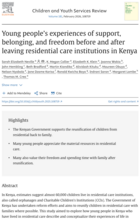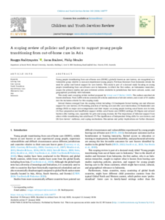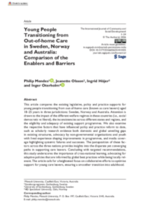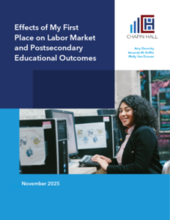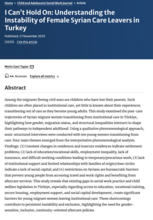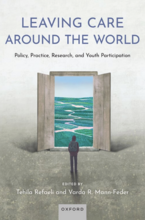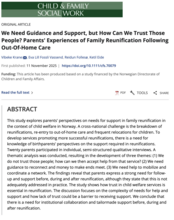Displaying 1 - 10 of 992
This study examined the relationship between disability type and service receipt among U.S. transition-age youth aging out of foster care, a population in which 53% have a diagnosed disability, using FY 2017 data from the National Youth in Transition Database merged with AFCARS for 9,353 cases across all U.S. states, Washington, DC, and Puerto Rico.
In Kenya, young people’s experiences of residential care and life after leaving care highlight trade-offs between material support, emotional guidance, and personal freedom. The study emphasizes that family strengthening and individualized case management are crucial to support children reunifying with families and successfully transitioning out of residential care.
This scoping review examines evidence from Asia and culturally comparable contexts to understand the experiences and support needs of young people transitioning from out-of-home care, with a particular focus on Indonesia. The findings highlight widespread gaps in formal leaving-care and aftercare support, alongside promising practices, the importance of informal networks and independent living skills, and the influence of stigma, gender, and resilience on care leavers’ transitions to adulthood.
This article compares the existing legislative, policy and practice supports for young people transitioning from out-of-home care (known as care leavers) aged 18–25 years in three jurisdictions: Sweden, Norway and Australia. Attention is drawn to the impact of the different welfare regimes in these countries (i.e., social democratic vs liberal), the inconsistencies across different states and regions, and the eligibility and adequacy of existing support programmes.
This study examines the experiences of 962 care-experienced adults from over 20 countries, focusing on the supports and barriers they encountered transitioning to adulthood after separation from parental care. Findings highlight the critical roles of supportive relationships, mental health and resilience, and access to education and resources, while also noting how financial hardship and limited services hinder successful transitions, informing recommendations for strengthened support systems.
The Chapin Hall report evaluates the My First Place program, which provides intensive case management and fully subsidized housing to young people aging out of extended foster care in six California counties. Using data on 2,598 participants, the report finds that program completers were more likely to be employed, earned higher wages, and were more likely to enroll in and complete a semester of college compared with nonparticipants or those who did not complete the program.
This study explores the experiences of young Syrian migrant women transitioning out of institutional care in Türkiye, revealing how gender, migration status, and structural barriers shape their pathways to adulthood. It finds that gaps in education, employment support, housing, social capital, and aftercare services create persistent instability and exclusion, underscoring the need for more inclusive, gender-sensitive aftercare policies.
This book reflects two decades of work by the International Network on Transitions to Adulthood from Care (INTRAC) to advance academic research and policy reform on leaving care globally. It includes thirty-two country chapters, each providing background information and key statistics on children in care and care leavers based on available national data.
This scoping review examined the scientific literature on youth aging out of substitute care in Canada to address challenges in estimating the country’s contribution to this growing global research field. The review identified key trends, research gaps, and future directions, emphasizing the need to better integrate existing findings to build a more cohesive Canadian evidence base.
This study examines Norwegian birth parents’ perspectives on the support they need for successful family reunification, revealing significant gaps in guidance, financial assistance, and help mobilizing social networks. The findings underscore that low trust in child welfare services can hinder parents’ willingness to accept support, highlighting the need for stronger institutional collaboration and tailored assistance before, during, and after reunification.

